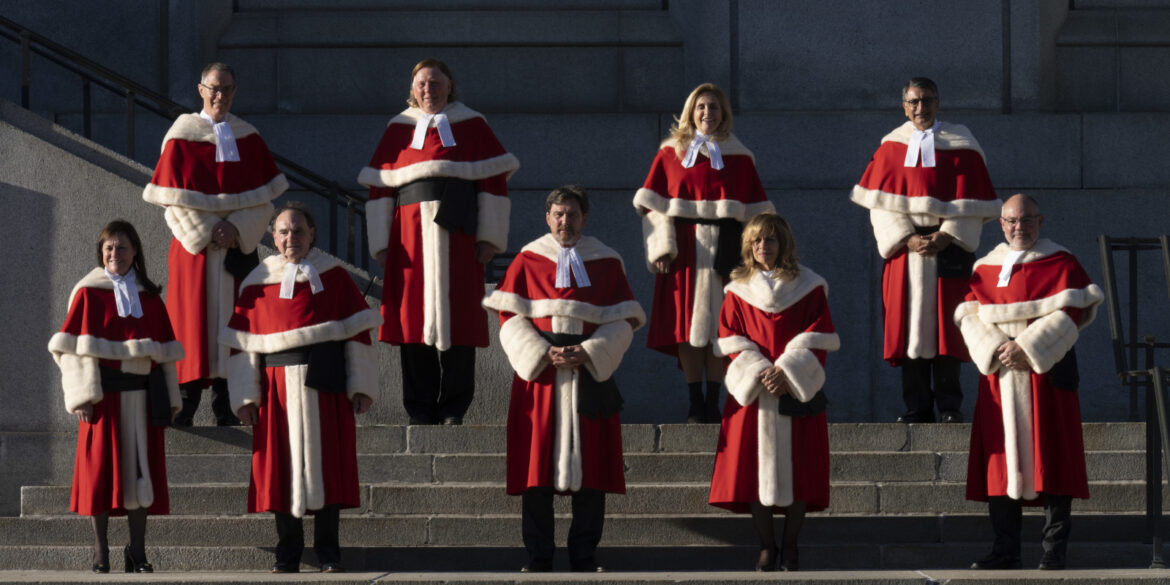Russell Brown announced on Monday that he would step down as a justice of the Supreme Court of Canada. The decision comes after the Canadian Judicial Council began probing a claim of misconduct against Brown related to an incident in the United States and for which the former justice has denied any wrongdoing.
Here at The Hub, we’ve assembled a handful of the country’s top legal minds for their instant reactions to Brown’s decision to step down and to explain what it means for law in Canada.
An indictment of the disciplinary process for Canadian judges
By Yuan Yi Zhu, an assistant professor of international relations and international law at Leiden University
Justice Russell Brown’s resignation from the Supreme Court of Canada is a blow to the quality of Canadian jurisprudence, which has for too long laboured under the baleful McLachlinism of the majority in the Supreme Court. But it is also an indictment of the disciplinary process for Canadian judges, which has long been unfit for purpose.
From Chief Justice Wagner’s decision to place Brown on an immediate leave of absence without official explanation on the basis of a flimsy complaint filed by a man who had assaulted his colleague, to the Canadian Judicial Council’s unbearably sluggish preliminary investigation which took the better part of half a year, to the numerous leaks from well-informed insiders to favoured journalists, the whole process has been designed to be as exhausting and wounding to Justice Brown as possible.
There can be no better illustration of what American law professor Malcolm Feeley described as “the process is the punishment.” Even if Justice Brown had been fully exonerated at the end of the open-ended process, his reputation would still have suffered, not to mention the fact that he would have been barred from exercising his chosen profession for the duration of the investigation, which could have run into years. Little wonder that he chose to resign, in the process forfeiting substantial pension rights and the opportunity for vindication, to put it all behind him.
Some readers may remember the case of Justice Lori Douglas, who was also dragged through the mud by the CJC’s open-ended investigative process without end in sight. Her main crime in the eyes of the CJC was that she had been the victim of revenge porn. After five years, Douglas resigned—humiliated and exhausted by the ordeal.
At the time, the CJC justified its vendetta on the grounds that the presence of the pictures on the internet was “inherently contrary to the image and concept of integrity of the judiciary,” thus undermining public confidence in the justice system. But what really undermines public confidence in the justice system is the sorry sight of a disciplinary process in which judges cannot even do justice to their own colleagues.

Brown’s departure leaves a yawning intellectual hole on the Court
By Howard Anglin, contributing writer at The Hub and doctoral student at Oxford University
When Russell Brown joined the Supreme Court of Canada in 2015 from the Alberta Court of Appeal, it was a place of comfortable conformity. While the apex courts in other countries regularly divide in sharp contests over the foundational questions of adjudication—What are the sources and limits of judicial legitimacy in a democracy? How do we apply generally-stated rights to specific situations?—ours had become known for an unusual degree of incurious unanimity. This is usually, and I think not unfairly, attributed to the influence of Beverley McLachlin, who as Chief Justice enforced benignant mediocrity with a firm hand.
Enter Justice Brown, a distinguished law professor with a decidedly Western view of Central Canadian establishment pieties and unafraid to question the Court’s stale dogmas. Even more surprisingly, he did so with a verve rarely seen in a judicial culture that discourages rhetorical flourish almost as much as it distrusts intellectual vigour. In dissents in cases such as References re Greenhouse Gas Pollution Pricing Act (defending the principle of federalism) and Trinity Western University v. Law Society of Upper Canada (defending religious freedom), he deftly punctured majority decisions that read Laurentian fashion into the constitutional text. And in Frank v. Canada (a non-resident voting case) he authored perhaps the most intellectually interesting opinion in recent Supreme Court history, challenging the very way the Court conceives of rights and their limits.
But I don’t want to give the impression that his legacy lies only in his dissents. As a persuasive writer and genial colleague, Brown was as adept at bringing along his colleagues in a majority opinion as he was dissecting them from the minority. His departure leaves a yawning intellectual hole on the Court. The Supreme Court today is a more jurisprudentially diverse body than it was eight years ago when he joined it, but it is always a threat to resume its old ways of lazy collegiality. If it does, at least future justices and scholars will have Brown’s trove of fine writing and clear thinking to challenge, inspire, and shake them out of that all-too-Canadian tendency to complacency.
His track record on the Supreme Court is extraordinary
By Joanna Baron, contributing writer at The Hub and executive director of the Canadian Constitution Foundation
Canada’s loss of Russell Brown following the announcement of his early retirement is monumental.
In writing this I have the mournful sense of writing a too-early judicial eulogy. Justice Brown was a judge of extraordinary rigour and clarity, who consistently hewed to the demands of the rule of law, namely clarity, consistency, and congruence.
His legacy includes his dissent in 2020’s Nevsun, a case where a majority of the Supreme Court decided, rather oddly, that a hotly contested norm of customary international law could be binding on Canadian courts. As Brown revealed, the whole point of customary law is that a practice has become so universal that its adoption as law is natural, and here the proposed legal claim—direct corporate liability for human rights violations—was novel and itself the case’s central controversy.
Brown also offered a strong and lucid defence of the constitutional division of powers in 2021’s Greenhouse Gas Pollution Pricing Act. He was skeptical of the move by the majority to accept that Parliament could wade into provincial jurisdiction to legislate reduction of carbon emissions under the “national concern” doctrine, noting that such a move would permanently vest exclusive jurisdiction in Parliament over any matter said to be of the vaguely defined “national concern.”
And in 2022’s Annapolis v. Halifax, a case where the City of Halifax promoted the use of a piece of privately owned land as a city park without offering compensation to the land’s owner, Brown authored an important precedent for protecting property rights in Canada (which are not guaranteed by the Charter). He traced back the protection of property rights to the common law on “takings.” The Court cited cases from the 1800s for this proposition, but the same principle of natural justice—that if the government confiscates your property you are entitled to compensation for it—likely is much older. And the decision in Annapolis importantly emphasized that such ancient common law rights continue in force, even if they are not part of the far younger Charter.
His track record in just under eight years on the SCC is extraordinary. It’s sad to consider the counter-history of what his judicial career might’ve been otherwise.

Canada needs more Russell Browns
By Sean Speer, The Hub’s editor-at-large
Conservatives often despair about their influence over policy and politics in Canada. But their lack of influence can be overstated. At various points in my own lifetime, conservative ideas about free markets and limited government have been on the ascendancy. In recent years, there’s been promising signs in some provinces of conservative education and health-care reforms. And we’ve even seen in recent days budding signs of conservative pushback against the excesses of identity politics and so-called “wokeism.”
The one area though where conservative despair has been justified is the judiciary. The “living tree” view of the Constitution has been the dominant (even the sole) judicial philosophy at law schools and on the bench for more than a generation. This of course has been at a time when the Charter has made the judiciary a critical locus of policymaking and political decisions. It’s notable for instance that many of the biggest political developments in the past forty years or so have come from left-wing judicial decisions including, most recently, the creation of a previously-rejected right to physician-assisted death.
Yet this despair about the progressive monopoly over the judiciary has been replaced in recent years with hopefulness about a new generation of law students and scholars who’ve begun in earnest to build an intellectual ecosystem that’s rigorous, substantive, and ultimately capable of challenging the prevailing legal monoculture.
Mr. Russell Brown was an important part of these developments. After being appointed to the Supreme Court by Prime Minister Harper in 2015, he became something of an intellectual beachhead for this burgeoning movement. He seemed to self-consciously understand this role.
His judicial dissents, including in high-profile cases like References re Greenhouse Gas Pollution Pricing Act and Trinity Western University v. Law Society of Upper Canada, gave this emerging cohort of conservative legal thinkers and practitioners a credible and different way to think about individual rights, the division of powers, and the role of the court. They represented an alternative future in which the court was far more circumscribed about reading its political preferences into the constitution.
His departure from the bench, therefore, represents a regrettable blow to these efforts. That future now feels farther away especially since he’ll predictably be replaced by another “living tree” exponent.
It’s important however, particularly for the young people involved in the legal movement that Brown came to personify, that it must ultimately be bigger than one person. While his resignation creates a significant void, it cannot bring an end to these efforts. Quite the contrary. It reinforces the need for more Russell Browns.
An honourable act by an honourable man in a dishonourable process
By Geoffrey Sigalet, the director of the UBC Centre for Constitutional Law and Legal Studies
Justice Russell Brown’s retirement constitutes an honourable act by an honourable man in a dishonourable process. The grounds for the Canadian Judicial Council’s investigation of Justice Brown are based on the words of a drunk ex-marine who told the policeman interviewing him “Shut up man, just shut your mouth.” Many of the ex-marine’s allegations were disproven by video and his companions’ social media posts. The most serious allegations against him—that he engaged in unwanted sexual advances—were made in the context of serious credibility issues and, if true, may not warrant removal from the bench. Making sexual advances toward strangers in a bar is allowed so long as basic boundaries are observed.
From what we know, Justice Wagner claimed to have “put [Justice Brown] on leave.” It is difficult to understand how Chief Justice Wagner could claim the power to put a puisne judge on involuntary leave. There is no authority for this under the Judges Act (which only contemplates voluntary leave for six months without cabinet approval). There is no precedent for a leave of this nature; though chief justices have authority to decline to assign judges credibly accused of potentially removable conduct to new cases, they are still allowed to complete their reserves and work with their colleagues in such a situation. Justice Brown was denied this. This essentially meant that Chief Justice Wagner removed a judge from our highest Court, which sets a terrible precedent for how to handle future complaints and threatens judicial independence.
As a result, Canada has lost the voice of one of its finest jurists on the Supreme Court. At a time of strong Western alienation, Alberta and Western Canada have lost their only true representative on the Court. Justice Brown was the only member of our highest Court to be born and raised for most of his childhood West of Ontario. (Justice Sheilah Martin deserves respect but she was born and raised in Montreal and her views on federalism and constitutional interpretation are in line with the centralizing “living tree” consensus.) The West has lost its most ardent champion for constitutional federalism, and that should not escape the attention of Premiers Eby, Smith, Moe, and Stefanson as the Liberal government begins to search for a new candidate to fill Brown’s Western seat on the Court.
The closing of the judicial mind
By Kerry Sun, a research associate at the Centre for Constitutional Law and Legal Studies, University of British Columbia Okanagan
The untimely retirement of Justice Brown from the Supreme Court of Canada marks a major loss for the juristic integrity and intellectual coherence of Canadian law. In an institution often characterised by right-thinking and straining for preferred results over right reason, his jurisprudence swam against the tide. He provided a cogent and reasoned, if inconvenient, voice against the imperious propensities of the Court and its own ideological blind spots—perhaps singularly exemplified by his dissent (with Justice Côté) in the Trinity Western University case, where he appealed against the majority’s “pernicious”, “far-reaching”, and “intolerant” judgment that effectively excluded a religious community from public life.
In both public and private law, Justice Brown’s reasons modeled fidelity to legal principle and coherence over “policy-based” decision-making, a domain he rightly viewed as falling beyond the proper limits of judicial power. Indeed, some of his most notable contributions were in dissent, such as critiquing the Supreme Court’s tendency to conceal its moral presuppositions within the technical-sounding device of “proportionality analysis” (R. v. K.R.J.); refuting the assumption, shared by many judicial supremacists, that Parliament is incapable of reasoning about rights and acting for the common good (Frank v. Canada); and unravelling Court’s assertion that Canadian federalism permits “minimum national standards” to be foisted upon the provincial governments (Reference re GGPPA). Equally, however, this fidelity to principle and legal learning informed his private law judgments, where he placed constraints on the role of “policy considerations” in tort law (Livent and Maple Leaf) and, among other things, defended the distinctiveness and integrity of the common and civil law traditions against a homogenising, reductive school of thought (Callow v. Zollinger).
Justice Brown’s jurisprudence took the law seriously, as animated by an internal logic and “legal language”—and not merely an instrument of judicial policy or preferred dogmas. It is why legal conservatives rightly regard Justice Brown as an intellectual leader, and why his premature departure is a true intellectual loss. His contributions should remind us that judicial activism is not a static question of whether the courts are frustrating the will of Parliament, but how judicial decisions are justified and whether they adhere to essential principle and the reason of the law.
For the inquisitive law student, therefore, Justice Brown’s legal corpus will repay careful study. For the Supreme Court of Canada, one may fear, his departure is a harbinger of the closing of the judicial mind.
Brown’s departure is a significant blow
By Stéphane Sérafin, an assistant professor at University of Ottawa
Justice Brown was the Supreme Court’s only true common lawyer and one of the few judges that would consistently give voice to the best aspects of our inherited tradition.
His departure puts an end to any serious challenge to the new role that the Court fashioned for itself in the post-Charter era, as a forum of “policy” akin to a legislature instead of one dedicated to adjudicating disputes and developing legal doctrine.
The implications are profound. In high-profile cases, Justice Brown has frequently served as the decisive vote and authored reasons that strive to provide a coherent and rational account of foundational principles. He has done the same in many less-noticed contract, tort and property law cases as well.
From Charter rights to the separation of powers to tort, contract law and property law, his departure is a significant blow for those of us who care about the proper role of the judiciary.
A singular voice in Canadian law
By Asher Honickman, the president of Advocates for the Rule of Law, and Gerard Kennedy, the executive director of ARL
We are saddened to learn of the retirement of Justice Russell Brown from the Supreme Court of Canada. Over the past 8 years, he has been a singular voice seeking to bring doctrinal coherence, fidelity to precedent, and legal predictability to vastly different areas of Canadian law. All the while, he has taken the lead in unearthing and expounding a Canadian doctrine of the separation of powers. These commitments will live on in his majority, dissenting, and concurring decisions such as Quebec (Attorney General) v 9147-0732 Québec inc; Toronto (City) v Ontario (Attorney General); Atlantic Lottery Corp v Babstock; Uber Technologies Inc v Heller; and Wilson v AECL, which doubtless influenced the majority decision of which he was part in Canada (Minister of Citizenship and Immigration) v Vavilov.
Justice Brown’s departure robs this country of one of the greatest judicial minds and legal writers to have presided over the Court in recent decades. We urgently recommend that the Prime Minister appoint a successor from Western Canada who exhibits a similar legal brilliance and commitment to foundational principles.
We understand what a difficult decision this must have been for Justice Brown and wish him success in all of his future endeavours.
Recommended for You

Everyone’s managing decline. I’m exploring a run for Ontario Liberal leader to fight for growth

Why extortion in Canada has surged in B.C., Alberta, and Ontario

‘He has to persuade people’: What’s at stake for Poilievre at the CPC convention

8 things to watch for as Conservatives gather in Calgary for party convention



